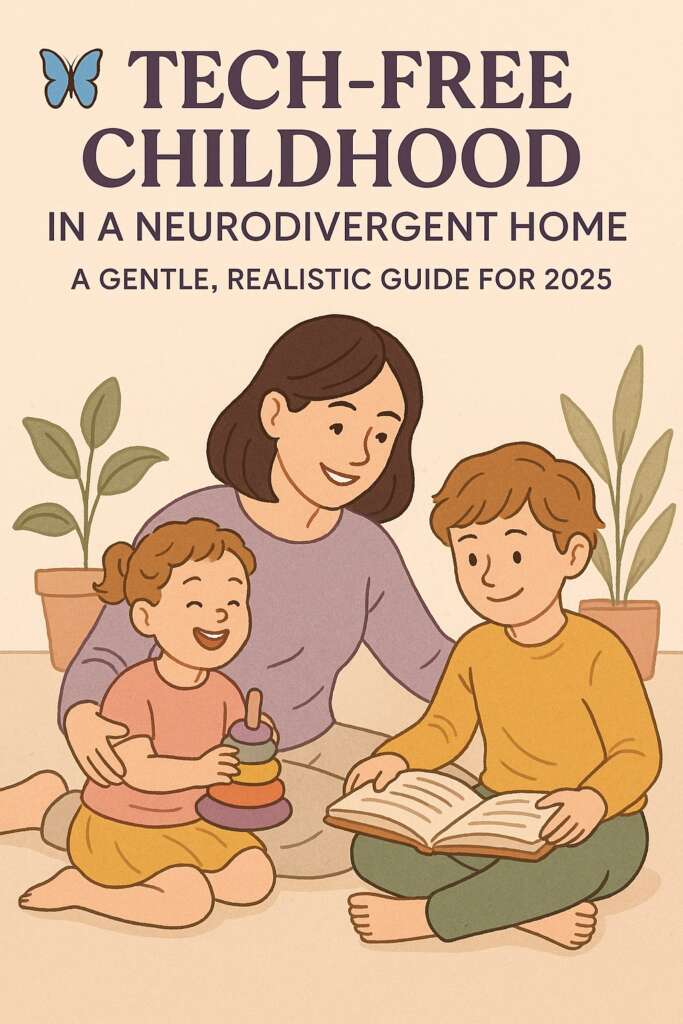Tech-Free Childhood in a Neurodivergent Home: A Gentle, Realistic Guide for 2025
Screens can feel like a lifeline—and sometimes a lifeboat. If you’re parenting neurodivergent children, here’s how to explore tech-light living without shame, struggle, or sudden changes.
Why Screens Are So Appealing—Especially in ND Homes
Screens offer something neurodivergent kids (and adults) often crave: predictability, pattern, control, and sensory stimulation. The world can feel too loud, too unpredictable. A tablet or phone? It obeys. It entertains. It regulates—until it overstimulates.
According to Ofcom’s Media Use and Attitudes Report 2024, 98% of UK children aged 5–15 use a screen device daily. Among children with ADHD, screen use tends to be longer, and patterns form earlier. But extended screen use is linked with disrupted sleep, emotional reactivity, and behavioural dysregulation—especially in ND children.
So how do we shift from all-day screen sessions to something gentler—without guilt, shouting, or sudden rulebooks?
Redefine Tech-Free
- “Tech-free” doesn’t mean zero screens. It means intentional, supported screen use.
- It means introducing soft pauses, visual routines, and low-pressure swaps.
- It looks different for every child. And it should.
What a Tech-Lite Day Looks Like
Let’s walk through a gentle day—not perfect, but intentional. One rooted in presence, not pressure.
Morning Anchor
No screens until the sun is up and socks are on. Use music to set tone: gentle playlists, nature sounds, or soft timers. Offer sensory tasks: pouring cereal, peeling fruit, rubbing lavender balm on wrists. Keep visuals available: “first/then” boards or a paper schedule with stickers.
Midday Anchor
If your child usually watches YouTube at lunchtime, try pairing that same calm moment with a tactile task—slicing bananas, sorting beads, pouring rice into a bottle. Use storytelling, audiobooks, or co-play to keep the nervous system supported.
Evening Anchor
Thirty minutes before bedtime, offer “tech wind-down” cues. Switch lighting to warm tones. Offer a Warmie, a lavender wheat bag, or a soft routine: books, shadow play, slow brushing, guided body scan audios. Allow screen use only for background ambience (e.g. a fireplace, wave sounds).
Breaking It Down by Age
Under 5s
- Use simple visual “tech timers” (colour-in clouds or sticker clocks)
- Offer handheld sensory swaps: mini weighted bean bags, bubble timers, textured cards
- Use YouTube as a “support” rather than a default—e.g. calming videos during hair brushing only
Ages 5–10
- Introduce “tech tickets” or gentle token systems (1 token = 20 mins)
- Encourage audio stories during screen breaks
- Use co-viewing as a teaching moment—talk about what they’re watching, how it makes them feel
Preteens & Teens
- Let them help co-create boundaries. Ask: “What would feel fair to both of us?”
- Use mood journals to track screen impact: sleep, energy, anxiety
- Offer screen alternatives that don’t feel “babyish”: playlists, sensory jewellery, podcasts
What If Tech-Free Isn’t Possible Right Now?
Some days, you’re surviving. Not shifting. Not swapping. Just trying to make it to bedtime. And those days? You don’t need a lecture. You need permission.
Permission Slips for Burnt Out Parents
- ✅ It’s okay to use screens as a break while you recharge
- ✅ It’s okay to change your mind later
- ✅ You are still a good parent when the TV is on
Gentle parenting isn’t about control. It’s about compassion—including for yourself.
Final Thoughts: Presence Over Perfection
This isn’t about never using screens. This is about building in moments of presence where you can. Screens aren’t evil. They’re tools. And like all tools, they work best when used with care, timing, and awareness.
Don’t rush to change everything. Choose one small tech pause. One gentle ritual. One tiny connection. And build from there. You’re not behind. You’re already moving forward—in your own time, at your own rhythm.
Want More Gentle Parenting Support?
Subscribe to the Darling Mellow Newsletter for weekly calm routines, ND-safe swaps, and gentle parenting truths that don’t rely on perfection. 💌


